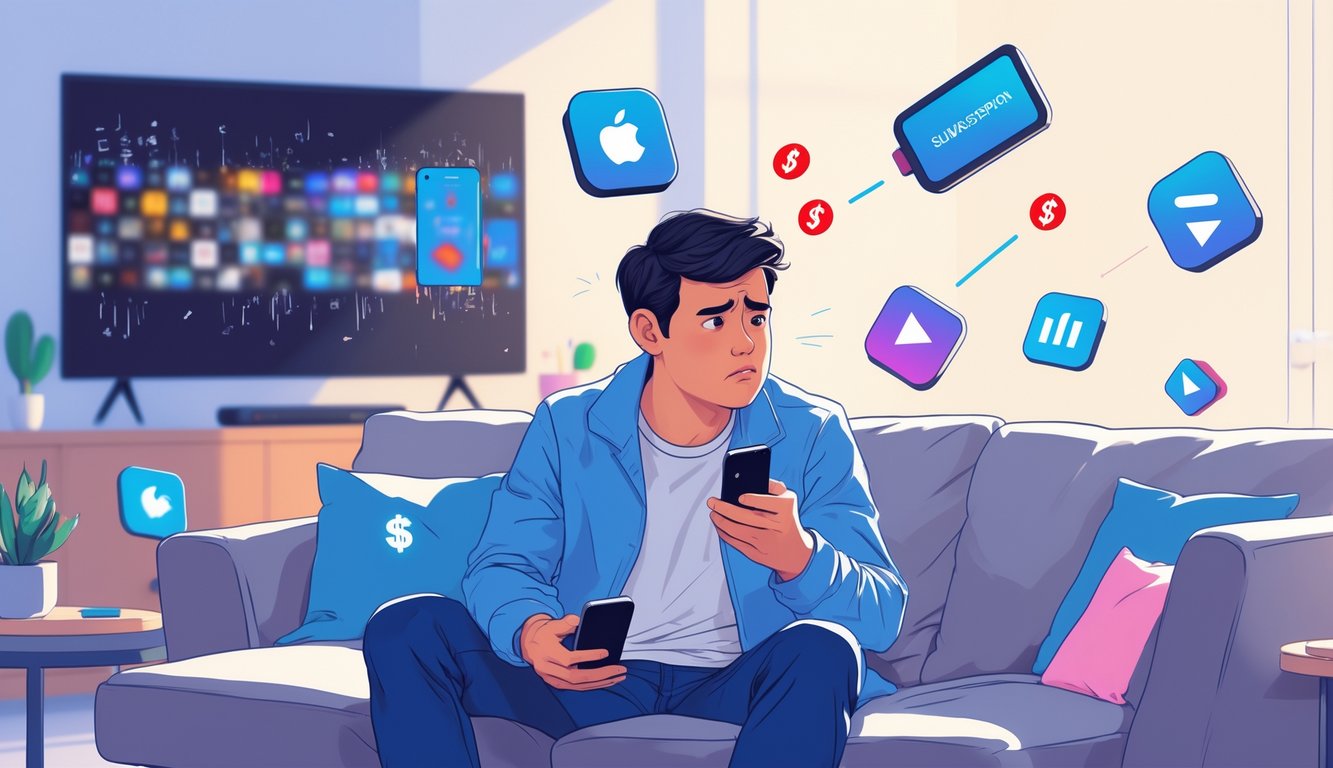
Smart Strategies for Managing Streaming Expenses
Why did my card get hit for three streaming services I thought I canceled? Oh wait, that was my “brilliant” system for catching up on award nominees. Subscription prices, “free” trials that want your DNA, hidden bundles—I need a spreadsheet just to watch TV.
How to Avoid Overpaying for Streaming
Tracking subscriptions is a nightmare. Netflix for a documentary, Disney+ for some show Reddit says is “essential,” and suddenly I’m blowing $50+ a month because every platform quietly raised their price.
Best thing I’ve done? Write it down. Literally, pen and paper or a free app. Sharing with family or roommates only makes it messier. Rotating one secondary service each month (like, Hulu this month, Max next) actually cut my costs by a third.
Don’t skip the boring stuff: set reminders for trial ends, check for sneaky auto-renewals, and use ad-supported plans unless you’re allergic to commercials. I switched one service from ad-free last week and saved $9. And yes, sharing premium plans (if it’s allowed) with friends is way better than paying for four separate accounts.
Tips for Choosing the Right Platforms
So many platforms, so little time. I get sucked in by “huge libraries,” but I’m not watching 90% of it. No shame in cutting a subscription that’s just collecting dust.
I started listing the shows I actually want to watch by platform—Apple TV+ had one, so, bye. If you’re stuck, try a bundle from your internet or phone provider (like Netflix and Peacock for $15). Might save a few bucks, unless you miss the fine print and get hit with random add-on fees, like Cloudwards warned.
Sometimes, you just have to call yourself out: am I here for one show, or do I actually use this thing? If you only watch a couple shows, bounce between platforms—subscribe for a month, binge, pause, repeat. Price hikes? They always sneak in via “account update” emails you ignore, so check those. And try some lesser-known platforms; some have cheap trials or niche stuff that’s actually worth it.
Frequently Asked Questions
Didn’t this used to be $6.99? My budget just evaporates—random fees, weird bundles, surprise upgrades hiding in account settings. Every time I talk Netflix or Max with friends, someone discovers they’ve paid double for a 4K stream nobody used.
Why are streaming services raising their prices recently?
Quick answer: content costs. Dan Rayburn (the one analyst I trust) says every company jacked up rates because production and licensing are expensive. Even the flops end up on my bill.
CivicScience found over half of people canceled at least one streaming account because of rising prices. No ceiling in sight. Paramount+ and Peacock barely hold steady; everyone else keeps climbing.
Ad-free tiers? Gone, unless you pay up for yet another “premium” plan.
What are some common hidden costs to watch out for with streaming subscriptions?
“Free” trials that sneak in device fees (got dinged $4 for adding my ancient iPad, which can’t even run Disney+). UHD and Dolby Atmos? Surprise upcharges. There are always regional taxes, random service fees, and fine print—Apple TV+ not only raised rates, but now the family plan charges extra for “legacy features.”
Bundle traps, too. Get a discount with your phone plan, but as soon as your contract ends, bam, $12 added to your bill. Budgeting for this stuff is a joke.
How can I compare costs effectively when choosing a streaming service?
Honestly? Make a spreadsheet. My finance buddy actually uses Google Sheets to track total cost with add-ons, taxes, bundles. Don’t trust the sticker price. Add notes like “cancel anytime?” and watch out for trial periods. The app UI won’t show the real total.
I’ve tried free comparison tools, but they’re always outdated after a price hike (like Hulu’s sneaky October bump). CNET and Tom’s Guide do annual roundups, but you have to dig past the influencer plugs.
Sometimes, the “annual deal” is actually more expensive once you break it down.
What should I consider before canceling my streaming service due to cost increases?
Tempting to just nuke the whole thing. But when I canceled HBO Max, I lost half my friend group’s “movie night” and all my saved favorites—no warning. Now I take screenshots, just in case.
If you use a service for kids’ profiles or shared history, check if you can export or transfer those. Family plans and Apple One-style bundles make it messy; sometimes you lose discounts on other stuff. And sometimes, a paused sub comes back at a higher price if you’re not careful.
How often do streaming platforms typically announce price hikes?
No consistency at all. Some wait years (Peacock), others (Netflix) bump prices almost every year. Apple TV+ hit me with a 40% jump, first ever. Some do “seasonal” hikes after content drops.
Usually, you won’t notice until a billing email you ignore. After the pandemic, price hikes got way more frequent. My tracker shows more “surprise” bumps in the last two years than in the whole decade before.
What are the best ways to stay informed about potential price increases for streaming services?
Honestly, I keep telling myself push notifications are supposed to help, but nope—missed two Disney+ hikes in a row because, surprise, I never check that stupid junk folder. And Twitter—wait, X, whatever—somehow spits out leak rumors way before any official announcement. I mean, does anyone actually read the provider’s blog? I try, but the real “oh crap” moment usually comes from my credit card app pinging me about a weird charge.
I’ve started throwing calendar reminders at myself every couple months, just to make sure I’m not getting quietly bled dry by subscriptions I forgot about. Sometimes I set a $100 ceiling—if I hit that, it’s time for a full-on audit, because those random platform and app store charges? They creep up fast. Manual tracking isn’t fun, but honestly, it’s the only way I’ve found to actually stay on top of this stuff. Algorithms? Please. They miss half the story.



